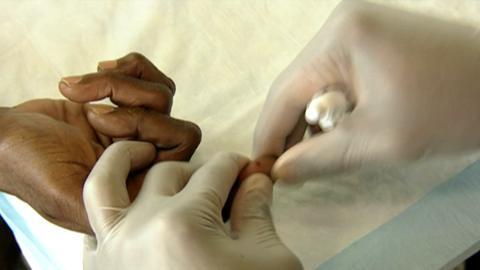
Health Alert: Diabetes
TRANSCRIPT:
Val Zavala: Diabetes is reaching epidemic proportions in the United States, and it's killing more people every year. The biggest single problem is not the diabetes itself. It's the lack of knowledge about this chronic disease. Tonight we want to introduce you to a doctor who is trying everything he can to stop what he calls a diabetic tsunami from wiping out whole communities. We must warn you this story contains graphic images which may be disturbing. Here's correspondent Michael Okwu.
Michael Okwu: It's Saturday morning in the heart of Inglewood, and at "In The Cut" barbershop, the conversation's already crackling.
It's a window into much of Black America on the weekend, where for generations the local barbershop has been a traditional gathering place for men.
But if you listen closely, the buzz you hear isn't just the sound of a cut and a shave. It's also the sound of lives being saved.
One Saturday every month, Dr. Bill Releford rallies a team of health care volunteers to make house-calls at Black-owned barbershops. Anyone who drops in for a cut gets a free check-up for diabetes — a major cause of heart disease, blindness, and amputations.
Releford, a podiatrist, got the idea four years ago after realizing black men — many uninsured — were among the least likely group to regularly visit a doctor.
Dr. Bill Releford: African-American men have the lowest life expectancy of any segment in the country. African-American men are more likely to have a heart attack and stroke and 20 times more likely to have kidney failure and to be on dialysis.
Okwu: Today the Black Barbershop Health Outreach program has screened over 10,000 men in 50 cities nationwide.
Many of the men he sees at the barbershop have never been in a doctor's office their entire adult lives.
Okwu [to Dr. Releford]: Some of these folks ended up being completely surprised that they have diabetes?
Dr. Releford: They call it the silent killer.
Okwu: And just minutes later, inside the shop, news of another diabetes casualty.
Barbershop customer: My father passed less than 30 days ago of a massive heart attack.
Dr. Releford: Is that right? Sorry to hear that. My prayers are with you. Was he diabetic?
Barbershop customer: Yes, sir.
Okwu: The silent killer is now reaching epidemic proportions across the country: nearly 26 million Americans have diabetes. Another 79 million have prediabetes. If the trend continues, it's estimated by the year 2050 one in three Americans will have the condition, and diabetes hits minority groups especially hard.
Here in Los Angeles County 12 percent of African-Americans have been diagnosed with diabetes, that's twice the rate of Caucasians.
There's also this, medical experts predict that for every two African-American children born today, one will develop type 2 diabetes. And for the first time in American history, the very first time, it's projected that those children will live a shorter life span than their parents.
Dr. Releford: The situation is horrific and I believe it's a situation where we need all hands on deck right now, because if we don't do it I think our already fragile health care delivery system is going to be overwhelmed with all of the complications from this preventable — and that's what blows my mind, it's preventable — this preventable disease.
Okwu: That preventable disease — type 2 diabetes — is primarily caused by obesity and a lack of exercise, pitfalls of the American lifestyle.
Dr. Releford: The hamburger, I call — and fast food, some fast food items — "the real weapons of mass destruction." When you see all the lives that are affected, the death and mortality that we see with obesity, something's gotta be done about it.
Okwu: And that's why at times Dr. Releford sounds more like a mother than a medical specialist. He's hoping he will only see these men at the barbershop and not back at the office, where he spends most of his time salvaging the feet of diabetics.
Okwu [to Dr. Releford]: I can't help noticing that you're right across the street from the cemetery.
Dr. Releford: How convenient because that is a good way for me to convey my message to people that if you don't do the right thing, then go across the street and see what they're doing over there.
Okwu: A warning. You may find these images disturbing: foot ulcers, gangrene, nasty open wounds — the harsh side effects of diabetes that can lead to amputation and a grim reality of a growing condition.
Which brings us to the story of 60-year-old James Tolbert.
Tolbert: My foot was amputated in '08 on my birthday. I went to the doctor because I had bumped my foot on an ironing board and two weeks later it had just started smelling real bad, and I went to the doctor and fifteen minutes later I was going down the hall on a gurney. And that was the end of my foot.
Okwu: Tolbert didn't have medical insurance and didn't manage his diabetes.
Tolbert: My first bill was $99,000 for the amputation. Got it. So you know, I'm behind the 8-ball all day. Started behind the 8-ball. So it's hard to catch up.
Okwu: On the day we meet him, it's his first visit to Dr. Releford in nearly two years. His amputated leg has developed an infection.
Dr. Releford [to Tolbert]: You need to stay in better touch with me. I haven't seen you since last year.
Tolbert: It was a financial situation, Doc. Couldn't do anything except pay the rent and eat.
Dr. Releford: I understand.
Okwu: Releford pushes Tolbert to eat fresh foods. It's a prescription that's become a mantra.
Dr. Releford: Five colors every day, fruits and vegetables. Something purple, something red — beets, bell peppers; something yellow — squash; something white — onions, garlic, leeks; something orange — carrots. You get the picture. Your plate's gonna look like a rainbow or a flower.
Okwu: But following the doctor's orders is tough when there's little access to healthy foods, an obstacle in much of Black Los Angeles. And when patients do find fresh produce, there's the problem of paying for it.
Tolbert: Like he says you gotta eat the whole rainbow, and now a bell pepper is $2.49 for one bell pepper. And you gonna need more than one for a week. So if you are eating all those colors, it's gonna cost you at least 30-40 dollars at the grocery store and that ain't no joke.
Okwu: For Tolbert, it comes down to this: buy food or buy medicine.
Tolbert: I'd rather treat my foot 'cause I can drink water and eat some crackers or something. But you know it's the thing about... That's why I'm a little smaller now.
Okwu: The next patient we meet is 43-year-old Riley Washington. Washington's diabetic and is hoping the doctor can save his foot.
Dr. Releford [to Washington]: Show me where they wanted to amputate before...
Washington: They said just below the knee, right here.
Okwu [to Dr. Releford]: We saw a 43-year-old patient today whose foot was recommended for amputation. Would we have seen that, a recommendation for amputation, with someone so young, 20 years ago?
Dr. Releford: No. What we're seeing now are people that are diagnosed earlier, in their late teens and early 20s, and with the earlier diagnosis we have an earlier onset of complication.
Okwu: New generations in the African-American community are facing a diabetic time bomb, triggered by fast food diets, insufficient exercise and a lack of accessible healthcare. Dr. Releford is attempting to defuse the disease, cut by cut, patient by patient — sobering since he concedes there's only so much he can do.
Dr. Releford: When I see patients in the office crying, in tears, when there is nothing else to be done, that didn't have to happen. And that bothers me the most.

Healthwise is a special series examining how community and environment can impact your health. Reports are made possible by a grant from The California Endowment.























